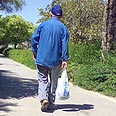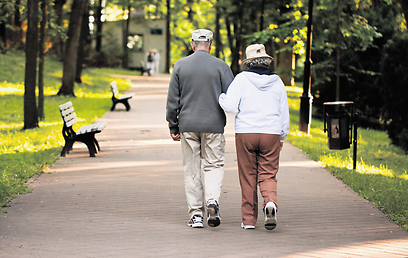
Israel in 2035: Older, less Jewish
Israel expected to populate 11.4 million inhabitants by 2035, 73% of whom would be Jewish, according to Central Bureau of Statistics report. Population expected to be older, life expectancy of women to nearly reach 90
In 22 years, Israel is expected to populate 11.4 million inhabitants, of which 73% would be Jewish. In addition, the percentage of adult and elderly population is expected increase significantly, with the Israeli female life expectancy reaching almost 90 years of age. These figures were given by the Israeli Central Bureau of Statistics (CBS) in a report released Tuesday detailing the population forecast for the year 2035.
The CBS forecasts that the average annual growth rate until the year 2035 will stand at 1.4%. In comparison, the average growth rate in the years 2006-2010 stood at 1.9%.
Related Stories:
- Report: Israeli economy grew 2.8% in Q1
- CBS: Jewish births up, Muslim births down
- Report: Palestinians to outnumber Jews by 2020
By 2035, the Jewish population is estimated to number 8.3 million people, about 73% of the entire population. The Jewish population in 2010 was 5.8 million, representing 75% of the entire population. The number of Jews in Israel is expected to grow at an annual rate of 1.4% by the year 2035. The growth rate in the years 2006-2010 stood at 1.8%.

Senior population to increase (Illustration) (Photo: Shutterstock)
The Arab population is expected to total 2.6 million people at the end of 2035, with Arabs accounting for 23% of the population. At the end of 2010, the Arab population stood at 1.6 million people, who represented 20.5% of the population. The CBS forecasts a decrease in the average annual growth rate for the Arab community, from 2.7% in recent years to 1.8% annual rate by 2035.
The CBS reports that 94% of the expected increase in the Israeli population would be the result of natural procreation and 6% would be due to immigration. To compare, in 2006-2011, immigration accounted for 11% of the population growth. The expected increase in natural procreation percentage (within the entire population growth) is based on estimates that aliyah figures would decrease.
Fertility rates gradually declining
The CBS predicts that the fertility rate of Israeli women would gradually decline but will remain relatively high compared to the Western world and neighboring countries.
In 2006-2010, the fertility rate in Israel stood at an average of 2.95 births per woman, and by 2031-2035 it is estimated to be at 2.75. According to United Nations forecasts, the fertility rate in that same period of time is expected to be 1.82 births per woman in developed countries. Looking at Israel's neighboring countries, the fertility rate is expected to be 2.41 in Jordan, 2.27 in Egypt, 2.23 in Syria and 1.53 in Lebanon.
Life expectancy is expected to grow, according to the CBS. The life expectancy of Jewish men is estimated to climb from 79.7 in 2006-2010 to 84.8 in 2031-2035, and the life expectancy for Jewish women is expected increase from 83.3 to 89.5. The life expectancy of Arab men will increase from 75.9 to 81.6 and for Arab women from 79.7 to 86.3, according to forecasts.
The CBS reports that the Israeli population will continue to age, with the over-65 age group to grow more than any other, and their proportion in the population will increase from 10% to 14.6%. This figure is still significantly lower than in other developed countries, where the elderly population is averaged at 24% of the population.
As a result of the aging process, the median age of the entire Israeli population is expected to rise by almost two years: The median age for men will increase from 28.3 in 2010 to 30.1 in 2035, and the median age for women will climb from 30.5 to 32.4.
- Receive Ynetnews updates directly to your desktop










